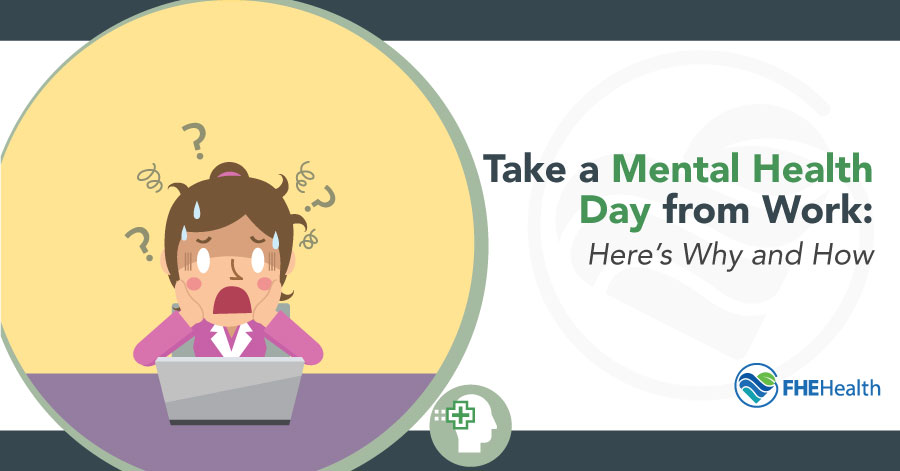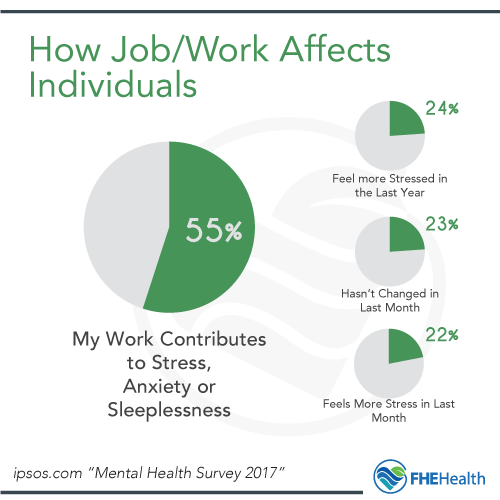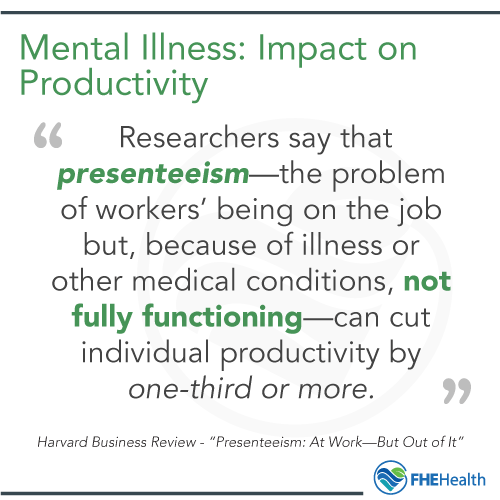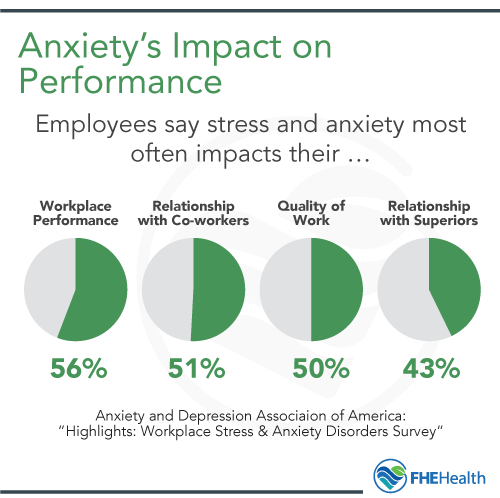
Many of us are so worn out from doing what the world tells us we should be doing that we forget to focus on our mental health. Taking a moment to recollect, reel in our worries and fears, and create new goals for the future isn’t something to put off. It’s crucial to maintaining your mental health.
Despite knowing our need for a mental health day, many of us feel unable to take a day off to unwind and recharge our batteries. When and how often should you take a mental health day?
Is It Okay to Take a Mental Health Day?
You probably have plenty of mental health day excuses that you haven’t considered. Job stress is one of them. With any job, you might feel stressed at the pressures to complete tasks under deadlines.
A moderate amount of stress can be a good thing if it encourages you to focus and work productively. Yet, there’s a fine line, and you can push yourself too far. At that point, you’re no longer doing a good job.
Burnout happens when you regularly have high stress levels. Burnout can be defined as unusually prolonged or excessive amounts of stress in reaction to your job or lifestyle. If you’re feeling perpetually exhausted, are beginning to resent your job, or feel unable to work efficiently, you may be experiencing burnout.
While burnout itself isn’t recognized as a mental illness, it can go hand in hand with diagnosable conditions. It can worsen an already existing mental illness or be a contributing factor that causes one. Burnout is commonly seen in people who have anxiety disorders, depression and other mood disorders.
It’s important to note that burnout itself is usually temporary and less severe than a mental health disorder. It’s usually caused by environmental and situational factors rather than a chemical imbalance, which is biological.
Nevertheless, burnout can take a tremendous toll on mental health. The good news is that a mental health day may be just what you need to get some relief.
Can I Take a Mental Health Day?
Check your employer’s policies before you call out. Most employers allow for personal or sick days. You could use vacation time if you schedule your mental health day far enough in advance. Call HR if you’re thinking about taking time off — it’s better to plan ahead than learn at the last minute that you’re not eligible for paid leave.
While full-time employees usually get paid leave, part-time employees may be ineligible. However, your supervisor might let you take an unpaid day off. Don’t force yourself to wait for your next day off if you’ve reached your breaking point.
Best Practices for Taking a Mental Health Day
Don’t feel bad for taking a mental health day. Studies show that 20% of adults suffer from mental illness, so mental health days are important. However, stay professional and courteous to maintain a good relationship with your employer. Here are some tips for requesting a mental health day.
- Ask as soon as possible. Don’t wait for your shift to start before calling HR and letting them know you’re taking a mental health day.
- If possible, schedule your day off ahead of time. This gives your supervisor time to rearrange the schedule or find someone to cover the shift.
- Get right to the point. You don’t need to send your boss a lengthy explanation. They just need to know you’re taking a day off.
- Send an email instead of just calling to create a paper trail. That way, your supervisor can’t claim you didn’t ask for the day off.
- If you work at an office, offer to work from home if you’re feeling up to it. However, don’t push yourself — your mental health is more important.
When Is a Mental Health Day Justified?

When you ask your boss for a mental health day, you may want to have something to support your claim that you need this. What’s a good enough reason?
A mental health day isn’t the same as a personal day or sick day. It’s meant to be a time when you play hooky for the benefit of your mental health. Here are a few reasons why you may need to do this:
- Are you feeling exhausted even if you sleep for seven to nine hours at night? If you don’t sleep well, are you awake because your mind is busy thinking about work problems?
- Do you feel depleted? You may feel this if you’re no longer interested in your work or lack the ability or opportunity to come up with new ideas and solutions to problems.
- Do you just go through the motions? Sometimes, you may feel it’s important just to get a project done, and you don’t care about the outcome.
- Is your health suffering? You may not be eating well or engaging with friends and family because of your job.
- Are you facing an outside challenge that’s changed your world significantly? This could be the death of a loved one, a break-up or a significant illness of a loved one.
- Are you struggling with the people you work with on a daily basis? If office politics is making it hard for you to enjoy the work you do, it may be time for a break.
- Are you too anxious? Being a bit worried about a presentation is normal. Being so worried that you’re making yourself sick isn’t. If your stress and anxiety are rising to unexpected levels, that’s a clear sign you need a break.
A mental health day is one of the best steps to take in situations such as these. Any time you feel like you just can’t do what you usually do, your brain’s telling you that you need a break.
Burnout Isn’t the Same as a Mental Health Crisis
The respite from the daily grind that we are addressing here is different than a true mental health emergency. Being overwhelmed could be a factor that exacerbates mental health disorders, but taking a mental health day isn’t meant to address diagnosable mental crises, such as an anxiety attack or bipolar disorder.
The term “mental health day” isn’t used to lessen the seriousness of mental health problems; it’s an acknowledgment that we all need to take care of our mental well-being, and it can be improved with a day off.
Why Take a Mental Health Day?
 A sick day is a common and acceptable way to take a day off work. However, taking a mental health day is a far less common thing to do.
A sick day is a common and acceptable way to take a day off work. However, taking a mental health day is a far less common thing to do.
Mental health is just as important as physical health, and more workplaces should let employees take mental health days. Many do allow it when it’s justified.
When you take a mental health day, you’re recharging, rebooting and getting back to a good level of focus. This can create a wide range of benefits for you and your boss:
- You’re more focused when you’re at work.
- You have new ideas and can come up with creative solutions to problems.
- You’re happier, and that translates into a better work environment.
Schedule Your Mental Health Day in Advance Whenever Possible
It’s always best to schedule routine time off to ensure you’re getting the care you need. For some, the weekends are a good mental break each week. If you’re working on your days off or thinking about work, then chances are good you’re not getting enough of the mental break you need.
When you don’t take this time off, you end up with an unexpected problem and an immediate need. If you wake up feeling mentally drained and just can’t motivate yourself to get to work, you may need that unexpected day off. Allow yourself to recognize that your body and mind need one thing and one thing only: rest.
Mental Health Day Email Template and Excuses: How to Ask for Time Off
Now that you can see how valuable a mental health day is, you need to communicate this directly to your boss. Focus on what’s happening, why you think it’s happening, and what good can come from a day off. Here’s are some examples:
Mental Health Day Email Templates
Not sure how to approach your boss or coworkers? Use these templates to let your employer know you’re taking time off in a friendly, professional manner.
Being Direct
The recent extra hours and mental stress I’ve experienced over the last few weeks has led me to be exhausted. I need to request a mental health day so I can recoup and refocus.
I’m confident that, with this day off, I’ll be able to provide better productivity, focus and work quality. I’ve covered my workload for the day and hope you’ll see the benefit in excusing my presence today.
Taking an Unplanned Mental Health Day
Hi [name],
I’m writing to let you know that I’m not feeling well and won’t be in today. Hopefully, I’ll be able to come back tomorrow — if not, I’ll let you know as soon as possible. Let me know if you need anything else from me.
Thanks,
[name]
Taking a Planned Mental Health Day
Hi [name],
I’m writing to let you know that I’m using my PTO on [date]. I’ll check my email the day before I leave, so please let me know if you need anything from me. I’m looking forward to being back in the office.
Thanks,
[name]
Taking a Partial Day Off
Hi [name],
I’m writing to let you know that I’ll have to take the afternoon off on Friday. I have a dental appointment and won’t be able to get back before my lunch break is over. Let me know if you need anything else from me.
Thanks,
[name]
Declining a Shift Request
Hi [name],
I’m afraid I won’t be able to pick up the extra shift tomorrow because I have a doctor’s appointment. Thanks for asking me, and please let me know if you need anything else.
Thanks,
[name]
Be sure your email always communicates the benefit to the employer for providing this day off. It also needs to state why you deserve it.
Company Policies for Mental Health Days
If you don’t find any success following these steps, it may be helpful to familiarize yourself with the language of your employee handbook. There might be exceptions that allow for situations such as mental stress, and if there is not one specifically, you may find language that supports your claim.
If your situation is recurring and you believe it can be supported by medical or psychiatric findings, you may be able to file a legitimate claim of disability or hardship that requires time off. If you do not yet have proof of this disability, you may consider getting the appropriate paperwork from a psychiatrist or doctor. Once HR has this paperwork on file, they are likely to be much more accommodating than they would be if they were unaware of an ongoing issue.
If your need for a mental health day stems from bereavement, there is very likely a clause allowing this in your company policy. Similarly, if this is time off may require a longer period, you may be eligible to file an FMLA (family medical leave act), although this is often at the discretion of the employer.
Finally, if you truly need a mental health day, consider how easy it is to take a sick day at your place of employment. If company policy requires you to get a doctors note, this may be problematic. It would also be ill-advised to call in sick and spend the day at the beach updating on social media. The truth is, high levels of mental stress can cause medical issues, so consider your circumstances as well as the risk/benefit of lying to your employer! If your employment is causing this amount of stress, perhaps you could even use a step back.
What Does a Mental Health Day Look Like?
 While taking one day off may not solve the deep underlying problems that lead to burnout, it’s still a valuable action you can take for yourself. So, what does a mental health day look like?
While taking one day off may not solve the deep underlying problems that lead to burnout, it’s still a valuable action you can take for yourself. So, what does a mental health day look like?
As stated before, it may simply look like resting. Sleep in, watch your favorite television series, read a book, sleep some more or simply do nothing. As long as this isn’t an everyday thing, it’s perfectly okay to treat yourself to some much-needed relaxation.
But maybe rest isn’t the only thing you need; maybe you’ve been craving a fun day of activities that deeply interest you. Whatever your hobby might be, go and do it. Go to that painting class, go bird-watching, get a haircut, spend some time playing an instrument, or make some jewelry. Whatever it is that excites you and takes your mind off the stress of work, do it.
Maybe you need to spend the day reflecting on why you had to take it in the first place. Sometimes, the stress keeps piling up, and you don’t even have a second to take a step back and see what’s causing it. Use your mental health day to identify the patterns or habits that may be leading to burnout.
While you may not be able to eliminate the stressors in your life completely, it can be extremely beneficial to list them and start making an effort to reduce them. You may realize that you’re taking on more responsibilities at work than necessary and that you have trouble saying no when people ask you to do things. It’s small things like this that you can change, and it can lead to better mental health.
Taking Care of Your Mental Health Daily
It’s possible to improve your mental health every day, not just during a mental health day. Incorporate relaxation strategies into your daily routine, even at work, to combat stressful situations.
- Breathing exercises are easy to master, and you can use them at any time to reduce feelings of stress or anxiety.
- Meditation can produce a deep feeling of relaxation. You can do it in the morning before work, during breaks, before bedtime or whenever fits best for you.
- Music can be a great tool to help you relax. It’s also proven to improve your mood very quickly.
- Exercise isn’t always easy to work yourself up to do, but you’ll find that it releases endorphins and causes you to feel much more relaxed afterward.
When it comes down to it, your mental health is extremely valuable, and you should always prioritize it. Be open and honest with your boss. You don’t need creative mental health day excuses.
How Often Should You Take a Mental Health Day?
That depends on the way you feel each day, week and month. Learn to monitor your stress levels and make adjustments accordingly. If you’ve made every attempt to reduce your stress at work and still feel overwhelmed, don’t hesitate to take a mental health day.
At FHE Health, we believe your mental health is important, and we have an entire team of highly qualified professionals dedicated to helping you with yours. Check out our resources to learn more about mental health care.
If a mental health day isn’t enough to help with your stress, or you think you may be struggling with a mental illness, don’t be afraid to reach out for help. Contact us today by calling (833) 596-3502. Our compassionate team of counselors is standing by to take your call 24/7.






